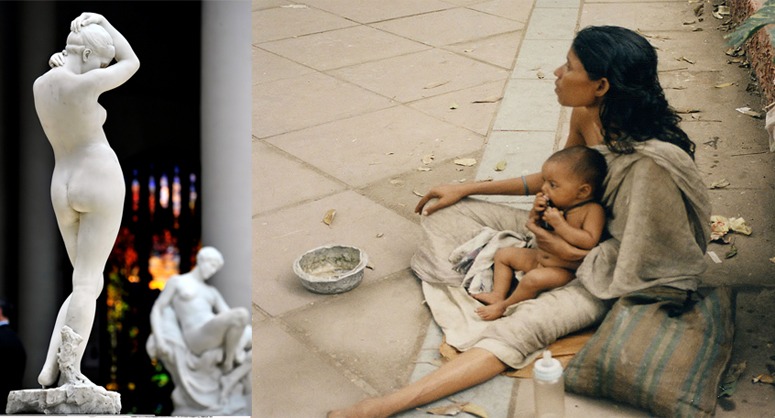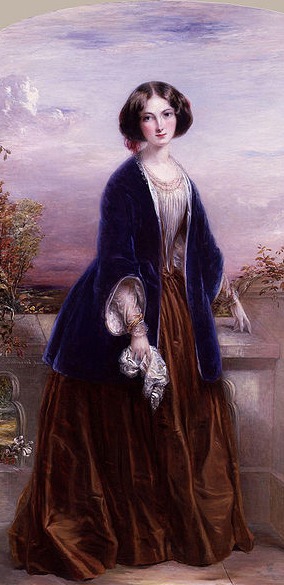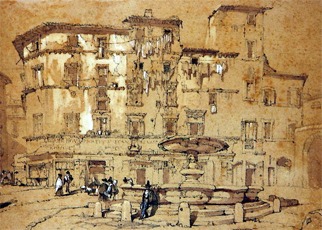
 John Ruskin was one of the most brilliant writers of the nineteenth century. We all tread in his picturesque footsteps when exploring foreign cities and taking street photographs. But take care. Ruskin wrote that “Yesterday, I came on a poor little child lying flat on the pavement in Bologna – sleeping like a corpse – possibly from too litte food. I pulled up immediately – not in pity, but in delight at the folds of its poor little ragged chemise over the thin bosom – and gave the mother money – not in charity, but to keep the flies off it while I made a sketch. I don’t see how this it to be avoided, but it is very hardening.” Or was he a hard man? The beautiful Effie Gray (right) thought him oppressive. Her marriage to Ruskin was never consumated because, it is said, he knew of female beauty only from marble statues and was horrified to discover that real girls had pubic hair. Effie divorced Ruskin and had 8 children by his friend, the Pre-Raphaelite painter, Sir John Everett Millais.
John Ruskin was one of the most brilliant writers of the nineteenth century. We all tread in his picturesque footsteps when exploring foreign cities and taking street photographs. But take care. Ruskin wrote that “Yesterday, I came on a poor little child lying flat on the pavement in Bologna – sleeping like a corpse – possibly from too litte food. I pulled up immediately – not in pity, but in delight at the folds of its poor little ragged chemise over the thin bosom – and gave the mother money – not in charity, but to keep the flies off it while I made a sketch. I don’t see how this it to be avoided, but it is very hardening.” Or was he a hard man? The beautiful Effie Gray (right) thought him oppressive. Her marriage to Ruskin was never consumated because, it is said, he knew of female beauty only from marble statues and was horrified to discover that real girls had pubic hair. Effie divorced Ruskin and had 8 children by his friend, the Pre-Raphaelite painter, Sir John Everett Millais.
Above image of India courtesy Dey Alexander. Below drawing, by Ruskin, of Piazza Santa Maria del Pianto, Rome.


Well I must say Ruskin got rule 1 right: marry a real girl and not a statute.
He was an only child, educated at home and subsequently studied at King’s College London and Christ Church Oxford. Ruskin died in January 1900. It wasn’t until 1885 that moves were made to create a Ladies Department of King’s College. It began at no 13 Kensington Square.
However, I don’t believe Ruskin was truly hardened to the implications of poverty, after all as a social reformer he campaigned for free education and libraries. But perhaps he was not what we would call today a feminist thinker.
I agree, and guess that he was shy rather than unkind. But I also think he was right to question the picturesque attitude to poverty. Similarly, you can feel uncomfortable about flood tourism, and about slowing down to view road accident, while also thinking that there is something to be learned from the world’s horrors.
I am happy to criticise myself for not wanting all the world’s poor countries to become rich and for not wanting all the world’s empty ‘wastes’ to be filled with happy families.
The problems with our ideas of poverty might be summarised with the question ‘Is this man poor?’ [ http://www.nzhistory.net.nz/media/photo/tukaroto-matutaera-potatau-te-wherowhero-tawhiao-0 ]
Ruskin was perhaps born too early. All of my visits to German saunas over the last years have confirmed that almost no one much under the age of 30 has pubic hair any more. If they do, it is usually cut into artistic shapes and designs. Perhaps this would have appealed to the artist in him.
Here is some comment on the subject from “Der Spiegel”.
http://www.militaryphotos.net/forums/showthread.php?161327-Pubic-Shaving-Trend-Baffles-Experts
How would Ruskin have lived if born in our own time? I’d like to think that he would give his attention to landscape architecture. This is where he began, with John Claudius Loudon as his first editor, and he might have continued with the subject if he had seen its present potential. And would the openness of the modern world have let him get round his awkwardness with Effie? I hope so.
Difficult to say given that in Ruskin’s Lectures on Landscape he conceived of America as a country “without any history”.
The conceptual leaps to the modern world would seem to be quite substantial. But being a man of intellect and curiosity I suppose he would have adapted.
I suppose ‘history’ used to mean the story of kings, queens and battles – in which case a new Ruskin could defend his old position.
When bored, in meetings or doctors’ waiting rooms, I like to look at the faces of strangers and guess what they would have done if they had lived eg in the Middle Ages. Ruskin would surely have been a priest, and in the modern world I suppose he would be a university lecturer and, perhaps, a presenter of TV programmes. He had that curious combination of being shy and yet enjoying the glamour of a public performance.
We have a lot of TV historians in the UK and I wonder if it is mainly a UK role? The present generation is heavily influenced by Simon Sharma and ape his every mannerism, without matching his perceptiveness. Some of them are terrible: so interested in boosting their trivial egos that they never let you see a famous place without it being obstructed by their grinning jaws and Sharma-imitations. They rarely bother to tell you the name of the famous place. For them it is merely a ‘location’ for their performance – a film set, a step on a road to personal glory. They could have much more useful lives as Elvis Presley impersonators, or selling ice-cream in cinemas.
Quite right, different eras produce different career opportunities. In the middle ages choosing ‘knight’ as a career path was possibly a little easier than it is today. I suppose a similar minded young person in contemporary times would probably join the SAS, the diplomatic corps or become an Olympic equestrian or even a music performer as you suggest.
Tim Brooks is an American TV historian, so I suppose the role is wider than the UK. [ http://en.wikipedia.org/wiki/Tim_Brooks_(television_historian) ]
However it seems the celebrity historian is a UK phenomenon.[ http://www.independent.co.uk/news/media/the-history-men-672153.html ]
Given my own interests, I should be able to understand the English enthusiasm for history. But I can’t.
If I think round the people I know it is hard to think of anyone who would have chosen to be a knight. My guess is that they have become sportsmen.
Do you mean if they could have wished for the talent to be a sportsman? [ http://www.suite101.com/content/what-it-takes-to-become-an-elite-athlete-a94818 ]